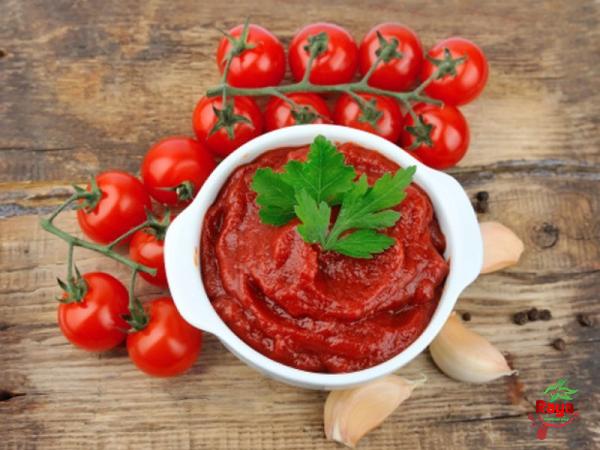Exploring the Benefits and Production of Organic Tomato Paste Introduction: Organic tomato paste has gained popularity among health-conscious consumers in recent years due to its numerous advantages over conventional tomato products. This article aims to provide an in-depth exploration of organic tomato paste, including its benefits, production methods, and market trends. 1. What is organic tomato paste? Organic tomato paste is made from tomatoes that have been grown without the use of synthetic pesticides, fertilizers, or genetically modified organisms (GMOs). These tomatoes are cultivated using organic farming techniques, which prioritize environmental sustainability, biodiversity, and soil health. 2. Health benefits of organic tomato paste: a) Rich in antioxidants: Organic tomato paste is packed with lycopene, a powerful antioxidant that gives tomatoes their vibrant red color. Lycopene is known for its potential to reduce the risk of certain cancers and improve heart health. b) Nutrient-dense: Organic tomatoes used in the production of tomato paste are bursting with essential vitamins and minerals, including vitamins C, A, and K, potassium, and folate. c) Improved flavor: Organic tomatoes often have a more intense and authentic flavor compared to conventionally grown tomatoes. This enhances the taste and quality of organic tomato paste. 3. Organic tomato paste production: a) Organic cultivation: Organic tomatoes are grown without the use of synthetic pesticides, herbicides, or fertilizers. Natural pest control methods and composting techniques are employed to maintain soil fertility. b) Harvesting and sorting: When the tomatoes are ripe, they are carefully harvested by hand to ensure minimal damage. Sorting follows to separate damaged or immature fruits from those suitable for processing. c) Processing: The tomatoes are washed, sorted again, and then crushed into a pulp. The pulp is then simmered slowly to remove excess water and concentrate the flavors. The resulting tomato paste is preserved using organic methods, such as low-temperature evaporation or freezing. d) Packaging: Organic tomato paste is usually packed in food-grade containers that preserve its freshness and prevent contamination.

tomato paste
 4. Market trends and consumer demand: a) Growing demand for organic products: The organic food industry is experiencing significant growth, with an increasing number of consumers seeking healthier and more sustainable options. This includes the demand for organic tomato paste, as consumers are becoming more conscious of the potential health risks associated with conventional tomato products. b) Expansion of organic farming: The rise in demand for organic tomato paste has led to an expansion of organic farming practices. Both small-scale farmers and larger agricultural operations are dedicating more land and resources to organic tomato cultivation. c) Availability and distribution: Organic tomato paste can be found in health food stores, organic grocery chains, and online platforms specializing in organic products. Its availability continues to expand as demand increases. d) Premium pricing: Organic tomato paste typically commands a higher price compared to conventional alternatives. This is mainly due to the additional costs associated with organic farming practices and the limited supply in the market. 5. Certifications and labeling: a) Organic certification: In many countries, organic products, including tomato paste, must meet specific standards and obtain certification from accredited certifying bodies. These certifications ensure that the product adheres to organic farming practices and meets the required quality and safety standards. b) Labeling requirements: Organic tomato paste is often labeled with specific certifications, such as USDA Organic, EU Organic, or equivalent, to inform consumers about its organic status. Additionally, labels may include information about the product’s origin, ingredients, and any additional sustainability or fair-trade certifications. Conclusion: Organic tomato paste offers numerous health benefits, including higher nutrient content, improved flavor, and a reduced risk of exposure to synthetic pesticides. Its production involves organic farming techniques that prioritize environmental sustainability, making it an attractive choice for eco-conscious consumers. With the growing demand for organic products, the availability and distribution of organic tomato paste continue to expand. As consumers become more aware of the benefits of organic produce, the market for organic tomato paste is expected to flourish in the coming years.1. Market Analysis: Organic Tomato Paste Industry The organic tomato paste industry has witnessed steady growth over the past decade, fueled by increasing consumer awareness about the benefits of organic products. The market analysis reveals that consumer demand for organic tomato paste is driven by factors such as health consciousness, environmental concerns, and the preference for superior taste and quality. Market studies project a compound annual growth rate (CAGR) of over 8% for the organic tomato paste industry over the next five years.
4. Market trends and consumer demand: a) Growing demand for organic products: The organic food industry is experiencing significant growth, with an increasing number of consumers seeking healthier and more sustainable options. This includes the demand for organic tomato paste, as consumers are becoming more conscious of the potential health risks associated with conventional tomato products. b) Expansion of organic farming: The rise in demand for organic tomato paste has led to an expansion of organic farming practices. Both small-scale farmers and larger agricultural operations are dedicating more land and resources to organic tomato cultivation. c) Availability and distribution: Organic tomato paste can be found in health food stores, organic grocery chains, and online platforms specializing in organic products. Its availability continues to expand as demand increases. d) Premium pricing: Organic tomato paste typically commands a higher price compared to conventional alternatives. This is mainly due to the additional costs associated with organic farming practices and the limited supply in the market. 5. Certifications and labeling: a) Organic certification: In many countries, organic products, including tomato paste, must meet specific standards and obtain certification from accredited certifying bodies. These certifications ensure that the product adheres to organic farming practices and meets the required quality and safety standards. b) Labeling requirements: Organic tomato paste is often labeled with specific certifications, such as USDA Organic, EU Organic, or equivalent, to inform consumers about its organic status. Additionally, labels may include information about the product’s origin, ingredients, and any additional sustainability or fair-trade certifications. Conclusion: Organic tomato paste offers numerous health benefits, including higher nutrient content, improved flavor, and a reduced risk of exposure to synthetic pesticides. Its production involves organic farming techniques that prioritize environmental sustainability, making it an attractive choice for eco-conscious consumers. With the growing demand for organic products, the availability and distribution of organic tomato paste continue to expand. As consumers become more aware of the benefits of organic produce, the market for organic tomato paste is expected to flourish in the coming years.1. Market Analysis: Organic Tomato Paste Industry The organic tomato paste industry has witnessed steady growth over the past decade, fueled by increasing consumer awareness about the benefits of organic products. The market analysis reveals that consumer demand for organic tomato paste is driven by factors such as health consciousness, environmental concerns, and the preference for superior taste and quality. Market studies project a compound annual growth rate (CAGR) of over 8% for the organic tomato paste industry over the next five years.
Specifications of tomato paste
 2. Key Players and Brands Several key players dominate the organic tomato paste market, offering a range of products to cater to different consumer preferences. These include well-known organic food brands such as Muir Glen, Bionaturae, Amy’s Kitchen, and Eden Foods. These brands have built credibility in the market by prioritizing organic farming practices, sustainable sourcing, and transparent production processes. 3. Distribution Channels Organic tomato paste is distributed via various channels to reach consumers effectively. Traditional grocery stores, health food stores, and organic specialty stores remain important sales channels. Additionally, the rise of e-commerce has facilitated direct-to-consumer sales of organic tomato paste. Online platforms dedicated to organic products, including Amazon and Thrive Market, offer a wide variety of organic tomato paste options, making it convenient for consumers to access and purchase these products. 4. Pricing and Profit Margins Organic tomato paste generally commands a higher price than conventional alternatives due to the additional costs associated with organic farming practices and certifications. The premium pricing reflects the higher production costs, limited supply, and the willingness of consumers to pay a premium for healthier, sustainable products. Profit margins for organic tomato paste producers can be higher compared to conventional paste, although this can vary depending on factors such as economies of scale, production efficiency, and market competition. 5. Organic Certification and Labeling Certification and labeling play a crucial role in the organic tomato paste industry, providing assurance to consumers about the organic status of the product. Organic tomato paste is typically certified by recognized certifying bodies such as the United States Department of Agriculture (USDA) or the European Union (EU). The certification ensures that the tomato paste has been produced using organic farming practices, meets the required quality standards, and is free from genetically modified organisms (GMOs) and synthetic pesticides. Labeling requirements also provide information about the product’s origin, ingredients, and any additional sustainability or fair-trade certifications.
2. Key Players and Brands Several key players dominate the organic tomato paste market, offering a range of products to cater to different consumer preferences. These include well-known organic food brands such as Muir Glen, Bionaturae, Amy’s Kitchen, and Eden Foods. These brands have built credibility in the market by prioritizing organic farming practices, sustainable sourcing, and transparent production processes. 3. Distribution Channels Organic tomato paste is distributed via various channels to reach consumers effectively. Traditional grocery stores, health food stores, and organic specialty stores remain important sales channels. Additionally, the rise of e-commerce has facilitated direct-to-consumer sales of organic tomato paste. Online platforms dedicated to organic products, including Amazon and Thrive Market, offer a wide variety of organic tomato paste options, making it convenient for consumers to access and purchase these products. 4. Pricing and Profit Margins Organic tomato paste generally commands a higher price than conventional alternatives due to the additional costs associated with organic farming practices and certifications. The premium pricing reflects the higher production costs, limited supply, and the willingness of consumers to pay a premium for healthier, sustainable products. Profit margins for organic tomato paste producers can be higher compared to conventional paste, although this can vary depending on factors such as economies of scale, production efficiency, and market competition. 5. Organic Certification and Labeling Certification and labeling play a crucial role in the organic tomato paste industry, providing assurance to consumers about the organic status of the product. Organic tomato paste is typically certified by recognized certifying bodies such as the United States Department of Agriculture (USDA) or the European Union (EU). The certification ensures that the tomato paste has been produced using organic farming practices, meets the required quality standards, and is free from genetically modified organisms (GMOs) and synthetic pesticides. Labeling requirements also provide information about the product’s origin, ingredients, and any additional sustainability or fair-trade certifications.
buy tomato paste
 6. Competitive Landscape and Market Trends The organic tomato paste industry is witnessing significant competition as more players enter the market to meet the growing consumer demand. Market trends indicate a shift towards clean labeling, which emphasizes transparency and simplicity in ingredient lists. Additionally, consumer preferences for natural sweeteners and reduced sodium content are influencing product development in the organic tomato paste space. Companies are also exploring innovative packaging solutions, such as recyclable or biodegradable materials, to align with eco-conscious consumer expectations. 7. Sustainability Initiatives In response to increasing environmental concerns, sustainability has become a key focus for organic tomato paste producers. Many companies are implementing sustainable practices throughout their supply chains, such as water conservation, energy efficiency, and waste reduction. These initiatives not only contribute to environmental stewardship but also resonate with consumers who prioritize sustainable and mindful consumption. 8. Challenges and Opportunities Despite the positive market growth, the organic tomato paste industry also faces challenges. Limited availability of organic tomatoes due to variations in weather conditions and susceptibility to pests can impact the overall supply chain. Additionally, organic farming practices often require more labor-intensive techniques, resulting in higher production costs. However, these challenges also present opportunities for innovation and efficiency improvements in organic tomato cultivation, processing, and distribution. 9. Consumer Education and Awareness Consumer education plays a crucial role in driving the demand for organic tomato paste. As more consumers become conscious of the advantages of organic products, brands and retailers have a responsibility to communicate and educate consumers about the benefits, certifications, and sustainable practices employed in organic tomato paste production. This can be done through marketing and advertising campaigns, in-store promotions, and online content that highlights the nutritional benefits, environmental advantages, and ethical considerations of choosing organic tomato paste. 10. Future Outlook and Conclusion The future outlook for the organic tomato paste industry remains positive, with increasing consumer awareness and demand for organic and sustainable food products. As the market continues to expand, it is expected that organic tomato paste producers will invest in research and development to introduce innovative flavors, packaging solutions, and processing techniques. The industry will also witness collaborations and partnerships between organic tomato paste brands and farmers to ensure a steady supply of high-quality organic tomatoes. With the ongoing health and sustainability trends, organic tomato paste is poised to remain a popular choice among consumers seeking nutritious, flavorful, and environmentally friendly food options.
6. Competitive Landscape and Market Trends The organic tomato paste industry is witnessing significant competition as more players enter the market to meet the growing consumer demand. Market trends indicate a shift towards clean labeling, which emphasizes transparency and simplicity in ingredient lists. Additionally, consumer preferences for natural sweeteners and reduced sodium content are influencing product development in the organic tomato paste space. Companies are also exploring innovative packaging solutions, such as recyclable or biodegradable materials, to align with eco-conscious consumer expectations. 7. Sustainability Initiatives In response to increasing environmental concerns, sustainability has become a key focus for organic tomato paste producers. Many companies are implementing sustainable practices throughout their supply chains, such as water conservation, energy efficiency, and waste reduction. These initiatives not only contribute to environmental stewardship but also resonate with consumers who prioritize sustainable and mindful consumption. 8. Challenges and Opportunities Despite the positive market growth, the organic tomato paste industry also faces challenges. Limited availability of organic tomatoes due to variations in weather conditions and susceptibility to pests can impact the overall supply chain. Additionally, organic farming practices often require more labor-intensive techniques, resulting in higher production costs. However, these challenges also present opportunities for innovation and efficiency improvements in organic tomato cultivation, processing, and distribution. 9. Consumer Education and Awareness Consumer education plays a crucial role in driving the demand for organic tomato paste. As more consumers become conscious of the advantages of organic products, brands and retailers have a responsibility to communicate and educate consumers about the benefits, certifications, and sustainable practices employed in organic tomato paste production. This can be done through marketing and advertising campaigns, in-store promotions, and online content that highlights the nutritional benefits, environmental advantages, and ethical considerations of choosing organic tomato paste. 10. Future Outlook and Conclusion The future outlook for the organic tomato paste industry remains positive, with increasing consumer awareness and demand for organic and sustainable food products. As the market continues to expand, it is expected that organic tomato paste producers will invest in research and development to introduce innovative flavors, packaging solutions, and processing techniques. The industry will also witness collaborations and partnerships between organic tomato paste brands and farmers to ensure a steady supply of high-quality organic tomatoes. With the ongoing health and sustainability trends, organic tomato paste is poised to remain a popular choice among consumers seeking nutritious, flavorful, and environmentally friendly food options.









Your comment submitted.